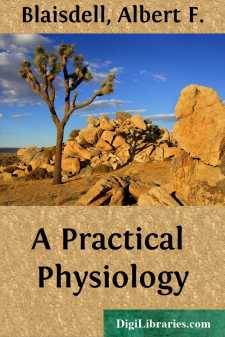Categories
- Antiques & Collectibles 13
- Architecture 36
- Art 48
- Bibles 22
- Biography & Autobiography 813
- Body, Mind & Spirit 142
- Business & Economics 28
- Children's Books 15
- Children's Fiction 12
- Computers 4
- Cooking 94
- Crafts & Hobbies 4
- Drama 346
- Education 46
- Family & Relationships 57
- Fiction 11828
- Games 19
- Gardening 17
- Health & Fitness 34
- History 1377
- House & Home 1
- Humor 147
- Juvenile Fiction 1873
- Juvenile Nonfiction 202
- Language Arts & Disciplines 88
- Law 16
- Literary Collections 686
- Literary Criticism 179
- Mathematics 13
- Medical 41
- Music 40
- Nature 179
- Non-Classifiable 1768
- Performing Arts 7
- Periodicals 1453
- Philosophy 64
- Photography 2
- Poetry 896
- Political Science 203
- Psychology 42
- Reference 154
- Religion 513
- Science 126
- Self-Help 84
- Social Science 81
- Sports & Recreation 34
- Study Aids 3
- Technology & Engineering 59
- Transportation 23
- Travel 463
- True Crime 29
A Practical Physiology
Description:
Excerpt
Chapter I.
Introduction.
1. The Study of Physiology. We are now to take up a new study, and in a field quite different from any we have thus far entered. Of all our other studies,--mathematics, physics, history, language,--not one comes home to us with such peculiar interest as does physiology, because this is the study of ourselves.
Every thoughtful young person must have asked himself a hundred questions about the problems of human life: how it can be that the few articles of our daily food--milk, bread, meats, and similar things--build up our complex bodies, and by what strange magic they are transformed into hair, skin, teeth, bones, muscles, and blood.
How is it that we can lift these curtains of our eyes and behold all the wonders of the world around us, then drop the lids, and though at noonday, are instantly in total darkness? How does the minute structure of the ear report to us with equal accuracy the thunder of the tempest, and the hum of the passing bee? Why is breathing so essential to our life, and why cannot we stop breathing when we try? Where within us, and how, burns the mysterious fire whose subtle heat warms us from the first breath of infancy till the last hour of life?
These and scores of similar questions it is the province of this deeply interesting study of physiology to answer.
2. What Physiology should Teach us. The study of physiology is not only interesting, but it is also extremely useful. Every reasonable person should not only wish to acquire the knowledge how best to protect and preserve his body, but should feel a certain profound respect for an organism so wonderful and so perfect as his physical frame. For our bodies are indeed not ourselves, but the frames that contain us,--the ships in which we, the real selves, are borne over the sea of life. He must be indeed a poor navigator who is not zealous to adorn and strengthen his ship, that it may escape the rocks of disease and premature decay, and that the voyage of his life may be long, pleasant, and successful.
But above these thoughts there rises another,--that in studying physiology we are tracing the myriad lines of marvelous ingenuity and forethought, as they appear at every glimpse of the work of the Divine Builder. However closely we study our bodily structure, we are, at our best, but imperfect observers of the handiwork of Him who made us as we are.
3. Distinctive Characters of Living Bodies. Even a very meagre knowledge of the structure and action of our bodies is enough to reveal the following distinctive characters: our bodies are continually breathing, that is, they take in oxygen from the surrounding air; they take in certain substances known as food, similar to those composing the body, which are capable through a process called oxidation, or through other chemical changes, of setting free a certain amount of energy.
Again, our bodies are continually making heat and giving it out to surrounding objects, the production and the loss of heat being so adjusted that the whole body is warm, that is, of a temperature higher than that of surrounding objects....



